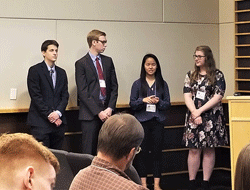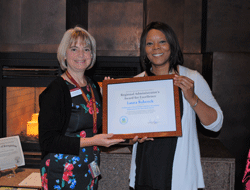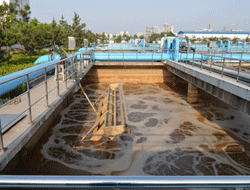September 2019 –Symposium was a Success!
Inside the Newsletter:
MnTAP’s Anniversary & Symposium | Intern Highlights | U.S. EPA Regional Admins Award | Curb Wastewater | MPCA Landscaping Grants | Blast From Past
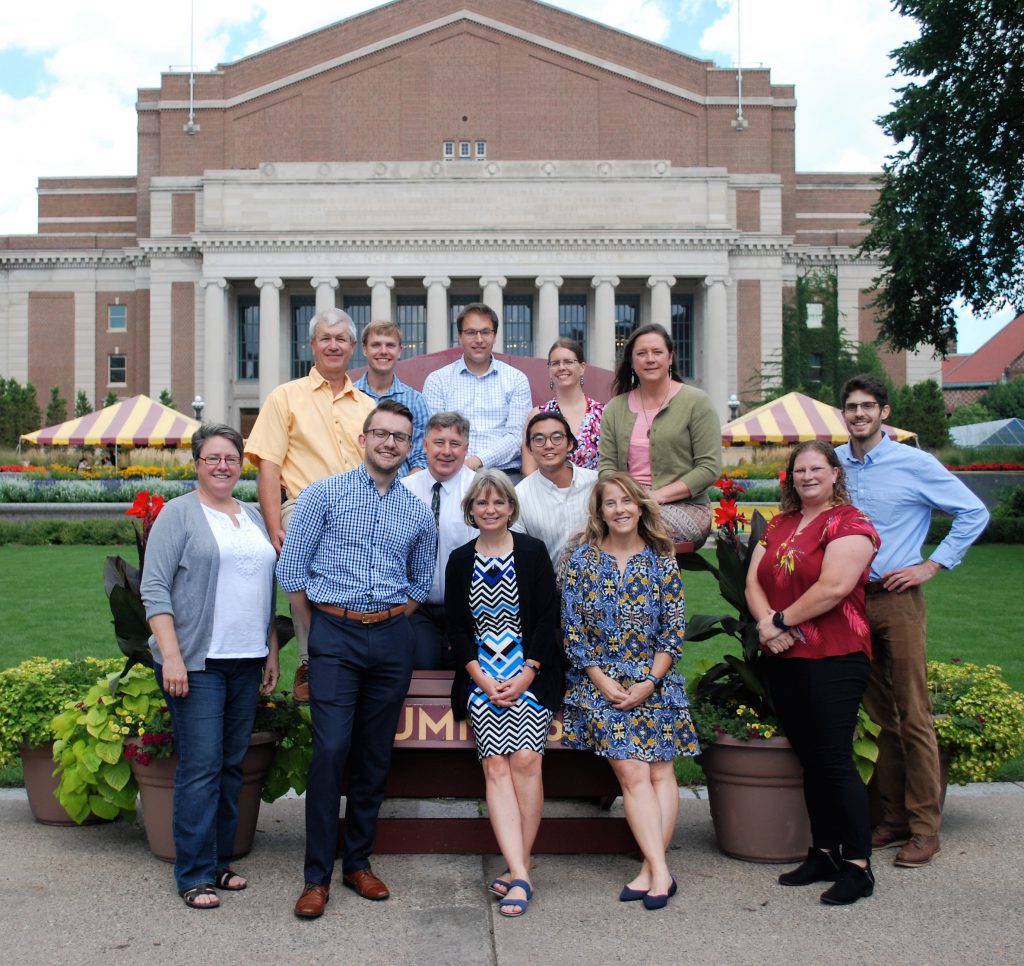
MnTAP’s 35th Anniversary Celebration & Intern Symposium
On Wednesday August 21, 2019, the Minnesota Technical Assistance Program (MnTAP) hosted a celebration of their 35 years providing no-cost, confidential pollution prevention technical assistance to Minnesota businesses. Way back in 1984 a small group formed at the University of Minnesota in the School of Public Health to promote waste minimization and pollution prevention for businesses across Minnesota in an effort to improve public health and the environment.
When MnTAP started there was no internet, there were no computers, no social media or cell phones. Site visits, classroom based training and information sharing through physical mail were the tools used to share the message of source reduction and pollution prevention. Over the years, MnTAP staff built the foundation for the strong, relationship-based technical assistance culture we still practice today. With the speed of information moving ever faster, current staff continue to promote source reduction, and site visits still serve an important role in helping companies improve their processes. The hazardous material management challenges faced by businesses continue to change but maximizing resource utilization and minimizing cost always seem to make good business sense.
MnTAP would not be celebrating 35 years of service to Minnesota if it were not for the faithful support from sponsoring agencies and collaborating partner organizations. From funding support to providing data as well as assistance in discerning priorities for future work, the agencies, organizations and companies that work with MnTAP are integral to any successes achieved. It takes a village to improve environmental outcomes for our State and MnTAP’s partners have all stepped up to the challenge.
Over the past 35 years there have been 63 MnTAP staff members and nearly 300 MnTAP student interns. Past and present MnTAP staff and interns have worked to help Minnesota businesses save
- 400 million pounds of solid and hazardous waste from being generated
- 800 million gallons of water from being used unnecessarily
- $53 million to strengthen Minnesota businesses
Several MnTAP partners provided messages reflecting different perspectives on MnTAP’s work.
Minnesota Pollution Control Agency (MPCA) Deputy Commissioner Peter Tester shared how MnTAP outreach and assistance activities help Minnesota achieve established pollution prevention goals and help engage businesses in improving their environmental and economic performance as a trusted partner and source of reliable technical information.
University of Minnesota, School of Public Health Professor William Toscano served as a long time principal investigator for MnTAP. Prof. Toscano spoke about the role MnTAP plays supporting the Land Grant Mission of the University by developing private/public collaborations for environmental and business improvement throughout Minnesota. MnTAP also provides students with significant insight to industry operations by providing guest lectures in classes and through student projects and internships.
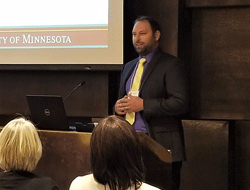 United States Environmental Protection Agency, Region 5 Environmental Specialist and Pollution Prevention Coordinator Christine Anderson described collaborations between EPA R5 and MnTAP to develop outreach and assistance programs to reduce hazardous air pollution in under served communities. This effort, conducted over several years, has resulted a partnership model for identifying safer products that work for the automotive repair sector suitable for replication in other states.
United States Environmental Protection Agency, Region 5 Environmental Specialist and Pollution Prevention Coordinator Christine Anderson described collaborations between EPA R5 and MnTAP to develop outreach and assistance programs to reduce hazardous air pollution in under served communities. This effort, conducted over several years, has resulted a partnership model for identifying safer products that work for the automotive repair sector suitable for replication in other states.
The Plant Manager for Atlas Corporation in Minneapolis, Mr. Zach Zurbey provided the keynote address to kick off the 2019 MnTAP Intern Symposium. Mr. Zurbey reflected on his experiences as a MnTAP Intern in 2009 and 2010. He spoke about how his experience with MnTAP was significant in forming his vision for the future, a specific work drive, and a clear desire for what he wanted out of his work. As he has progressed though his career, he continues to use what he learned as an intern to positively impact the businesses he worked for.
Intern Highlights
Each summer, MnTAP hires student interns to develop solutions to industrial waste problems for Minnesota companies that are unable to tackle pollution prevention projects due to lack of time or money. These interns are able to develop effective waste reducing solutions and save operating costs, reduce regulatory compliance burden, and decrease environmental impacts of Minnesota companies.
In 2019, sixteen companies hosted MnTAP student interns to help them solve a variety of pollution prevention and energy efficiency challenges. Below are some of their results.
- Ball Corporation, Minneapolis: This metal packaging corporation wanted to improve their systems for tracking water usage and consumption and energy. The intern found several ways to reduce their water usage by 5,700,000 gallons per year as well as replacing compressed air applications with blowers, saving the company over $400,000.
- Boston Scientific, Maple Grove: This medical device manufacturer was looking for ways to assess their water usage and recommendations for conservation. By recommending ways to reduce and reclaim water in several systems, their intern was able to save 3,800,000 gallons of water, $41,000, and up to $100,000 in possible SAC fees.
- Kerry, Rochester: This global food company wants to improve their water efficiency and waste management so that they can meet increasing production and maintain permit compliance. The intern recommended upgrading process control on the current effluent system saving 4,000,000 gallons of wastewater.
- White Bear Lake Area, St. Paul: The intern worked with businesses to recommend and promote the adoption of safer products to replace hazardous cleaning and degreasing products in local automotive shops. By connecting with 40 businesses, and switching products, worker safety and overall air quality for the entire community will be much improved.
- Verta, Inc, Delano: A provider of sustainable architectural metal finished, this corporation wanted to evaluate options to improve paint transfer efficiency and reuse cleaning solvents. The intern recommended ways to improve efficiency by refining the automatic sprayer range of motion, reclaim spent solvent, reducing water usage by 5,300 gallons and over 2 tons of VOCs.
In 2019, MnTAP interns made recommendations that will help companies save $1.4 million by reducing 8.4 million pounds of hazardous and solid waste, 88 million gallons of water, 5.7 million kWh and 190,000 therms per year.
More ProjectsMnTAP Receives U.S. EPA Regional Administrators Award for Excellence
During the Minnesota Technical Assistance Program (MnTAP) 35th Anniversary celebration, Christine Anderson, Environmental Specialist and Pollution Prevention Coordinator with U.S. Environmental Protection Agency, Region 5 presented the M nTAP with the U. S. Environmental Protection Agency Region 5, Regional Administrator’s Award for Excellence. This award was to recognize collaborative partnerships to reduce hazardous pollutants in the automotive sector. MnTAP has worked to develop and refine this collaborative partnership model through efforts in Duluth, Minneapolis and with businesses throughout the Twin Cities area in order to share it with others here and throughout the country.
“Safer Products That Work” was a 2014-16 effort supported by EPA Region 5 under the Source Reduction Assistance Program to demonstrate the use of lower hazard degreasing solvents at industrial and automotive sites. Companies (39) received technical assistance, resulting in annual reduction of 4,000 lbs/yr of air pollution and saving $7500 in material costs.
Project ResultsDegreasing alternative information was applied to the automotive repair sector in the St. Louis River corridor of Duluth in 2016. A key feature of this project was collaboration with a local partner engaged with the community, Ecolibrium3 to introduce MnTAP to the businesses. Over 50 automotive repair business learned about alternative products, 31 business received samples to test, 16 redeemed vouchers for trials and 9 business demonstrated implementation by purchasing the lower VOC product on their own. Use of less hazardous products reduced release of volatile organic compounds (VOCs) by 1,480 lbs/yr. A summary of safer products that work as penetrants, brake cleaners and degreasers was created.
MnTAP researchers have developed an outreach process to engage automotive repair businesses, evaluate their degreasing products, recommend functional alternatives with less hazardous components and support businesses in transitioning to the safer products that work.
- Engage a trusted community partner to help promote the project
- Offer no-cost assessments and identify safer products available from current business suppliers
- Provide test samples and a free month’s supply of products for companies agreeing to switch
- Follow up with facilities and suppliers to confirm the transition was complete
This methodology has been used successfully by pollution prevention professionals and interns in three Minnesota communities to date.
A MnTAP Intern in the Phillips Communities in Minneapolis with partners Hope Community, Lake Street Council and Franklin Area Business Association and funding from U.S. EPA shared safer product information with 24 companies. Alternative products were tested at 14 shops and 12 shops switched to safer products reducing 840 lbs/yr of volatile organic compounds from the community air.
The project was expanded to automotive repair businesses in North Minneapolis with partners University of Minnesota Urban Research and Outreach-Engagement Center (UROC) and West Broadway Business and Area Coalition (WBC) and funding from the Minnesota Pollution Control Agency (MPCA). There were 21 facilities engaged to share safer product information, 16 shops tested less hazardous product with 4 committing to switching to safer products reducing 520 lbs/yr of volatile organic compounds from the community air.
A MnTAP Intern in White Bear Lake with partner White Bear Lake Chamber of Commerce shared safer product information with 36 companies. Alternative products were tested at 18 shops and 6 shops switched to safer products reducing 1,900 lb/yr of volatile organic compounds from the community air.
Curb Wastewater Nutrient Challenges
Is your wastewater treatment system facing challenges with Nitrogen or Phosphorous loading?
Is your business facing pressure from the treatment facility to get a handle on wastewater releases?
The Minnesota Technical Assistance Program (MnTAP) has demonstrated that source reduction assistance can improve a wastewater facility’s ability to meet effluent targets while enhancing business operations through expanded capacity, improved quality and reduced cost.
Improve Wastewater Loading Quality in POTWsMnTAP staff and interns can help identify strategies for upstream nutrient reduction which can decrease load to local wastewater treatment and reduce the burden on our local bodies of water and wildlife.
- MnTAP Checklist: Phosphorus reduction opportunities walk through checklist. Review the suggestions on this checklist with your business users to identify strategies to reduce phosphorus discharge from their operations.
- Coating Process: Intern at Arctic Cat Reduces Water, Energy, and Chemical Use (2009). The company reduced their phosphorus concentration in the iron phosphate stage by limiting chemical additions to the system and using just the chemical that was already in the tank
- Coating Process: Minnesota Elevator Benefits from Switch to a New Coating System (2010). MEI evaluated alternatives to the iron phosphatizing chemical and switched to zirconium oxide (nano-ceramic) conversion coating, which is phosphate free, used at ambient temperatures, and does not require a seal rinse.
- Phosphorus: reducing releases from industrial cleaning and sanitizing operations: Housekeeping, janitorial operations, and process cleaning or sanitizing can be sources of significant amounts of phosphorus released to wastewater treatment plants. This fact sheet provides examples of how to reduce phosphorus through purchasing and procedure changes.
If your community, wastewater treatment plant and/or business could benefit from no-cost assistance with wastewater nutrient management, contact Matt Domski at mdomski@umn.edu / 612-624-5119 or Daniel Chang at dwchang@umn.edu / 612-624-0808.
Funding for this project is provided by the Minnesota Environment and Natural Resources Trust Fund as recommended by the Legislative-Citizen Commission on Minnesota Resources (LCCMR).
MPCA Grants Available for Landscaping Equipment
MPCA is offering $150,000 in grant funding to replace 2-cycle gasoline-powered landscaping and snow removal equipment with electric-powered equipment.
Gasoline-powered landscaping equipment is a significant source of air emissions in urban areas, impacting the health of equipment operators and the populated communities they serve.
The maximum award is $24,000 with a 50% required match.
Eligible applicants:
- Businesses under 500 employees
- Governmental agencies or tribal nations
- Educational institutions
- Non-governmental organizations (e.g., nonprofits, trade groups, industry associations)
Equipment used near populations sensitive to air pollution, in environmental justice areas, and in communities with higher air pollution will tend to score highest. All equipment being replaced must be scrapped or made inoperable.
Blast From the Past – WaterSense Labels Recognize Water-Efficient Products
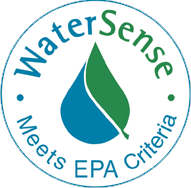 WaterSense labels recognize water-efficient products WaterSense, a program sponsored by the U.S. EPA, is working to protect the future of the nation’s water supply. They encourage water-efficient behaviors through the promotion of water efficiency and the enhancement of the market for water-efficient products, programs, and practices.
WaterSense labels recognize water-efficient products WaterSense, a program sponsored by the U.S. EPA, is working to protect the future of the nation’s water supply. They encourage water-efficient behaviors through the promotion of water efficiency and the enhancement of the market for water-efficient products, programs, and practices.
Identified by its symbol, WaterSense is a national program that helps consumers recognize products for their bathroom, lawn, and more which meet the EPA’s standards for performance and efficiency for water use.
MnTAP is an endorser of the WaterSense program and is committed to recruiting new WaterSense members, educating companies on the benefits of water and waste reduction, and providing technical assistance to help with reduction efforts.
By partnering with WaterSense, companies can access a variety of tools and resources to help build water efficiency. To find out if your organization is eligible to join WaterSense, check out the partnership category that best describes your potential involvement.
Check Eligibility